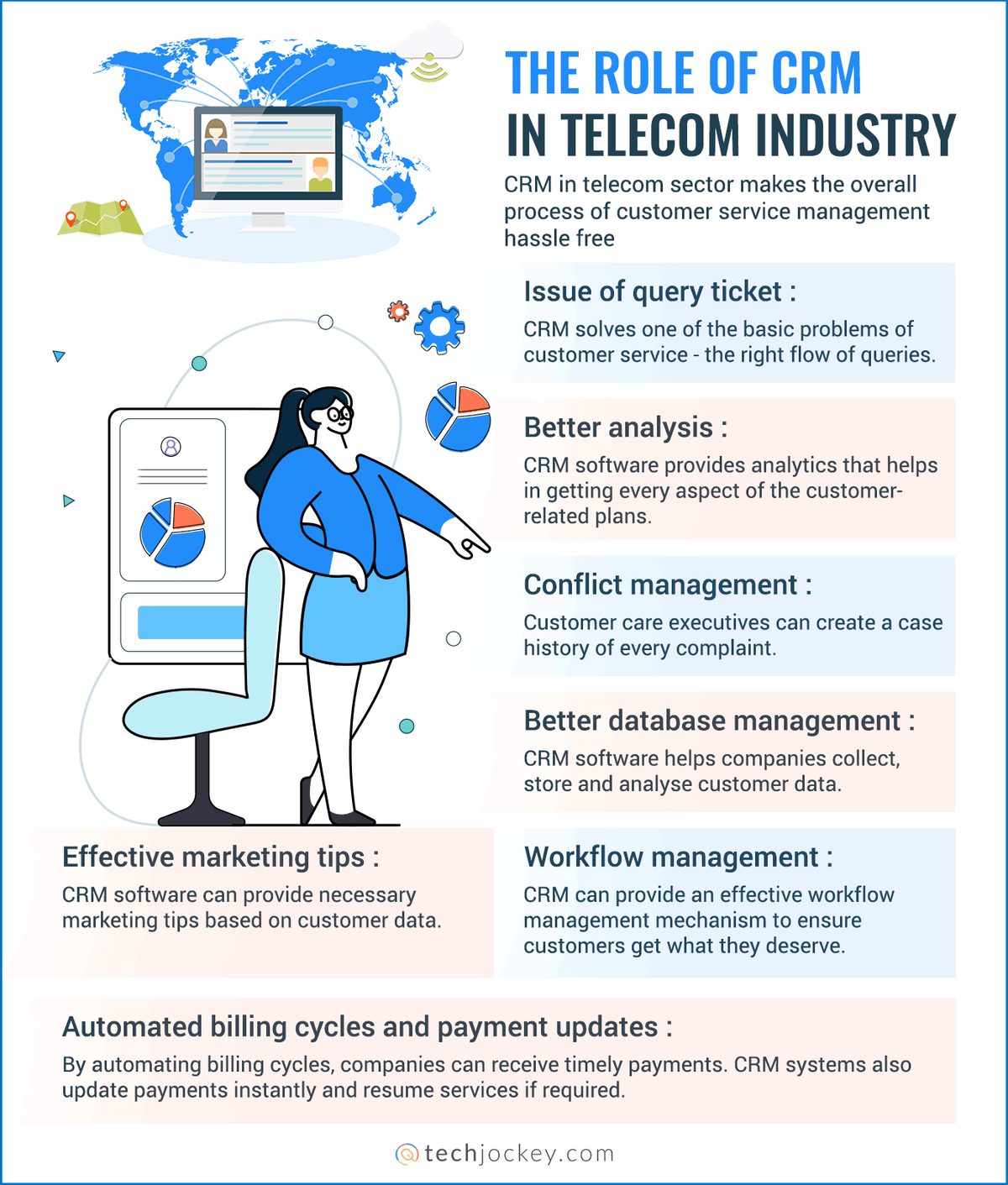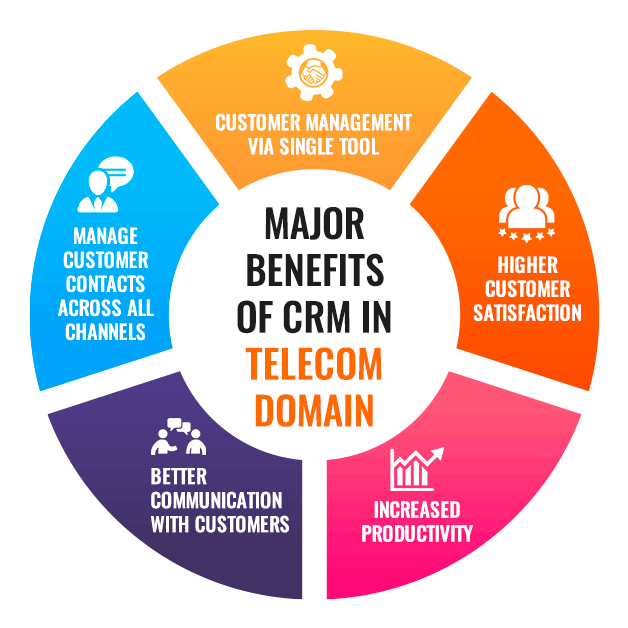Customer Relationship Management (CRM) is becoming a significant tool for industries like Telecom. Why?
As the technology is expanding, the demand for swift customer service and resolution is gaining ground. Telecom industries, catering to millions of customers every day, need technologies that can make their customer services more reliable and fast.
That’s where CRM comes into the picture. Telecom companies can cater to the needs of their millions of subscribers seamlessly. Moreover, a well-designed CRM in telecom domain would allow users to track customer data and gain valuable insights for long-term business growth.
In this article, we will see some of the best CRM software for the telecom sector. But before that, let’s understand what role CRM plays in the telecom domain.
The Role of CRM in Telecom Industry

CRM in telecom industry makes the overall process of customer service management hassle free.
Issue of query ticket: CRM solves one of the basic problems of customer service – the right flow of queries. Issuing trouble tickets, reviewing, singling out, and escalating problems are all part of this process.
Better analysis: CRM software provides analytics that helps in getting every aspect of the customer-related plans. This feature also allows companies to find out and target the potential consumer groups, increasing their conversion and retention.
Conflict management: Customer care executives can create a case history of every complaint. The case history will contain all the required information, including transaction details and the status of the resolution.
Better database management: CRM software helps companies collect, store and analyse customer data. Companies can use this necessary data to serve better.
Effective marketing tips: CRM software can provide necessary marketing tips based on customer data. This helps in launching specific campaigns and offering customised services and products.
Automated billing cycles and payment updates: By automating billing cycles, companies can receive timely payments. CRM systems also update payments instantly and resume services if required.
- Workflow management: CRM can provide an effective workflow management mechanism to ensure customers get what they deserve. Companies can even avoid errors and cut customer complaints down the line.
Suggested Read: List of Best CRM Software for Small Businesses in India
Major Benefits of CRM in Telecom Industry

AS you install telecom CRM or adopt cloud CRM for telecom, you are likely to enjoy all these benefits.
Customer management via single tool: CRM helps in user onboarding, establishing improved customer relationships, and handling queries quickly and effortlessly.
Higher customer satisfaction: Every customer needs a quick response from its service providers. CRM can fulfil this expectation by automating many processes. Prompt reply, refund processing, feedback collection, etc. are some of such processes.
Increased productivity: Since CRM automates many works, companies can focus on better marketing and sales strategies. This will enhance the overall productivity by many folds. Even collaboration between different departments is fluid with CRM.
Better communication with customers: Executives can track the right information about any customer instantly and ensure prompt response to their queries.
Manage customer contacts across all channels: You can track and manage customer contact details from all possible channels integrated to your telecom CRM solution.
10 Best CRM in Telecom Industry
- Comarch
- Elinext
- Creatio
- Kapture CRM
- SugarCRM
- Cerillion CRM Plus
- LeadSquared
- Salesforce
- Freshsales
- Oracle NetSuite CRM
Here’s the list of 10 best CRM for telecom sector that helps create personalised experiences for customers.
1. Comarch CRM

Comarch has become a synonym for user-friendliness in providing CRM for Telecoms sectors. Using Comarch CRM, employees can ensure individualized customer interactions across all channels.
Going a step ahead, Comarch makes data retrieval as simple as possible. You can also use it to incorporate personalised items in your offer, enhance your service quality and automate customer inquiries and orders. The user-friendly GUI seamlessly supports daily sales and back-office operations.
In other words, you have a complete 360 degree feedback perspective of the consumers at all times with this CRM in Telecom Industry.
Features:
- Multi-channel support for customer engagement
- AI-enabled analytics for behaviour analysis
- Loyalty management to engage with customers in the long term
- Seamless integration with any e-commerce and marketing platform
- Real-time reporting capabilities to choose from customizable dashboards
Pros
- Strongly focused on customer loyalty
- Extremely adaptable and flexible according to the industry
- Analytics is full-fledged
Cons
- Setting up is complex.
- There is restricted help documentation for first-time users.
Pricing: Available on request. Its pricing is based on enterprise needs.
2. Elinext CRM
Considered as one of the best Telecom CRM providers, Elinext is popular for providing enterprise-grade applications. It offers custom telecommunication software development and maintenance solutions. Elinext partners with enterprises of all categories. Among its clients are startups, small businesses, and large corporations.
It works on developing both OSS (Operations Support Systems) and BSS (Business Support Systems). It also specializes in video conferencing platforms, corporate portals, and mobile app development.
Elinext is known for providing advanced features to any business including telecom companies.
Features:
- Customized solutions of CRM according to the business needs of clients.
- ERP and other enterprise systems are well-integrated with it.
- Scalable to be used for small, medium, or large businesses.
- AI-powered customer analytics help make better decisions.
- It is safe and compliant with data protection standards.
Pros
- Customization of development to suit needs.
- Very strong on data privacy.
- Scalable to any scale of business
Cons
- The price is quite different with customizations.
- A limited number of pre-built integrations.
- Custom-based on development requirement
Pricing: Customized price.
3. Creatio CRM

Apart from CRM and process management, Creatio CRM is known for its low-code software as a service (SAAS) solution provider. Being a global leader in this segment, it offers a one-stop solution for workflow automation to companies aiming to leverage better work freedom.
Creatio is an ideal service provider for telecom companies looking to integrate disparate data systems and fragmented systems into a coherent solution to deliver a personalized omnichannel customer experience.
Features:
- Low-code platform for easy customization and automation
- End-to-end process management and workflow automation
- Built-in AI for predictive analytics and scoring.
- Seamless third-party integrations.
- Mobile-friendly, accessible via multiple devices.
Pros
- Easier to set up with low-code tools
- Strong workflow automation capabilities.
- Scalable with business growth.
Cons
- Offline features are not present.
- Steep learning curve for advanced capabilities
Pricing: Starting at $25 per user/month.
4. Kapture CRM
Kapture CRM is also a SaaS-based, enterprise-grade Customer Support Automation platform. It’s a cloud CRM that makes daily customer operation simple and efficient to meet the increasing demand.
It has multiple features that include customer data management, knowledge management, ticket management, an intelligent chatbot with contextual responses.
With omnichannel support operations, it helps respond to queries instantly received onto a centralised location. Further, API integration and a smart self-service portal help users carry their operations smoothly.
Features:
- Robust ticketing and management of support.
- Powerful mobile CRM for accessing the tool on the go.
- Real-time reporting and analytics tools.
- Multichannel support via several customer interaction channels.
- Integrates lead management and tracking capabilities.
Pros
- Great set of features for support management.
- Friendly to mobile for field teams.
- Affordable for small businesses.
Cons
- Limited advanced analytics.
- Options for customization are fewer.
Pricing: Beginning at $35 per user/month.
5. SugarCRM

SugarCRM is a cloud-based platform used for account management, sales and marketing automation, and customer relationship management.
SugarCRM offers a wide range of features like a customizable home page, a new-user “wizard” tool for newbies, a shortcut bar, enhanced-view global search functions, and downloadable plug-ins. It gives the freedom to customise the solution based on the company’s needs.
SugarCRM in Telecom integrates seamlessly with multiple third-party systems to streamline the contacts management and help desk ticketing process. The software makes things easier for employees by surfacing information when it is required.
Features:
- Open API to be fully customized and integrated.
- Sales workflow automation tools.
- Advanced reporting and analytics features.
- Customer journey track for personalized engagements
- Support in many languages, as well as currency
Pros
- Highly customizable due to API
- Has some very strong reporting tools
- Ideal for businesses that operate internationally.
Cons
- Needs IT resources for customization purposes
- Has a steep price range for its advanced packages
Pricing: Starting at $49 per user/month
6. Cerillion CRM Plus
Cerillion CRM Plus is an omnichannel CRM platform that integrates every facet of the customer relationship lifecycle for telecoms services.
Cerillion offers a fully integrated suite of functions that allows sales and customer service staff to manage all aspects of the customer lifecycle efficiently. It enhances the customer experience by facilitating high-quality customer service across all the channels.
It includes dealer outlets, online self-service, call centres, and social media platforms. This telecom CRM software ensures integrated workflow management and automated processes while providing a complete audit trail of customer contact activities.
Features:
- All-in-one CRM on billing, customer care, and revenue management.
- Subscription and usage-based billing capabilities.
- Customizable dashboards with real-time insights.
- Automated order processing and inventory management.
- Multichannel communication support.
Pros
- Comprehensive billing and CRM in one platform.
- Best suited for telecom and subscription-based industries.
- User-friendly dashboards.
Cons
- Not very scalable outside telecom.
- Very high initial setup costs.
Pricing: On request, for custom pricing
7. LeadSquared CRM

LeadSquared CRM is a pioneering name in consolidated marketing automation and leads conversion platform, headquartered in Bengaluru, India.
It helps B2B & B2C businesses track, manage, and nurture leads seamlessly. It offers services like mobile CRM, sales CRM, marketing automation, integrations, and conversion, all in one platform.
LeadSquared allows you to manage your entire database where you can build your own custom logic. It helps you to increase your closures and manage your pipelines easily. The company has emerged as a de-facto choice for all high-velocity sales organisations.
Features:
- Lead scoring and nurturing helps to target the most promising leads.
- The tools of marketing automation help to streamline campaign operations.
- Sales tracking to achieve greater pipeline visibility.
- Mobile CRM for remote teams.
- Seamless integration with many third-party tools.
Pros
- Strong lead management
- Easy interface
- Affordable for small to medium-sized businesses
Cons
- Advanced analytics is a little limited
- System speed will bog sometimes
Pricing: Starting at $25 per user/month.
Suggested Read: Best Open Source & Free CRM Software for Small Business
8. Salesforce CRM
Salesforce Sales Cloud is one of the best sought-after CRM platforms in the market. Its primary focus on sales and customer connections makes it the most preferred CRM in telecom domain.
Currently, it offers CRM in a SaaS deployment to offer business solutions for all sized enterprises. In addition, it also offers services for data management and workflow automation, with enhanced security.
Salesforce CRM’s other area of expertise includes lead management, marketing automation, and contact management. These applications assist businesses in managing client accounts, tracking sales leads, executing and monitoring marketing efforts, and providing post-sale care.
Salesforce Lightning Experience is an updated CRM version of Sales Cloud that improves the sales process by allowing any sales executive to easily generate and follow-up on customer leads, monitor account activity, track campaign status and create real-time reports.
Features:
- Highly customizable, with a wide marketplace of add-ons
- AI-Powered Einstein Analytics offers predictive insights.
- There is quite significant automation in the sales, marketing, and service space.
- Mobile app has impressive offline functionality
- Has extended third-party integration capability
Pros
- Well scale and flexibility
- Good app marketplace
- Comes with good support and training resources
Cons
- Will be expensive as features scale too
- Has steeper learning curve for new users.
Pricing: Starts at $25 per user/month; other plans vary based on features.
9. Freshsales (by Freshworks)

Freshsales CRM provides a complete range of automated solutions for marketing and sales processes. This telecom CRM software can assist users with better lead generation, sophisticated analytics powered by AI, and establishing a better customer relationship. Having said that, it has everything a salesperson needs.
By automating most of the processes, Freshsales gives companies more time to create winning sales strategies. Companies can now streamline the entire sales pipeline, thanks to Freshsales. By using native CPQ, it also streamlines the process of developing and distributing quotes and other critical sales elements.
Marketing teams can use Freshsales Suite to manage customer information, personalise and automate email communications, and find the best possible sales prospects.
Features:
- AI-powered lead scoring helps you prioritize leads efficiently.
- Native email and phone support smooth communication.
- A visual sales pipeline that is easily customizable through drag-and-drop functionality.
- Automatic lead and contact profile enrichment
- Powerful reporting and analytics tools.
Pros
- Easy to use; affordable.
- The system sharply focuses on lead management.
- Good integration options.
Cons
- Limited customization options in lower plans.
- Lags in some advanced automation.
Pricing: Starts at $15 per user/month.
10. Oracle NetSuite CRM
NetSuite CRM is a powerful tool to establish customer relationships and manage those with ease. Among its users are telecom companies of all sizes.
Users have access to a constant supply of data at all times and throughout their customer lifecycle. Telecom companies can deliver excellent customer experiences with NetSuite CRM from the early stages of lead management all the way through fulfilment and post-sales support.
Knowledge management tool is an example of one of its aspects. Businesses can use this platform to publish and organise their material, making it easier for customers and employees to discover the documents they need.
NetSuite CRM has strong and advanced operations such as marketing automation, sales force automation, and customer service management in addition to the standard features.
Features:
- Completely integrated end-to-end CRM with ERP.
- Advanced forecasting and management.
- Real-time dashboards for tracking performance.
- Multicurrency and multinational capability
- Integrated partner relationship management.
Pros
- Fully integrated ERP and CRM all in one package
- Scalable is very good for large enterprise sizes.
- Good financial and sale tracking.
Cons
- Quite costly for small businesses.
- Requires technical expertise before implementation is possible
Pricing: Available on request. Charges are custom-dependent according to the needs of the enterprises.
Suggested Read: Best Digital Marketing CRM for Marketers & Agencies
Conclusion
CRM systems are invaluable in dealing with large scale customers’ interactions and optimizing operations. Some of the great CRM solutions include Salesforce, Oracle NetSuite, and Comarch, which provide many features, including data management, automated workflows, tracking customers, and lead generation.
These tools enable telecommunication companies to standardize customer services through simple multi-channeling, tracking, and analyzing customer data, thus leading to increasing customer satisfaction and retention rates.
With these CRM platforms, telecoms are in a position to expand both productivity and customer experiences and relationships. This will eventually prove to be long-term business growth in an increasingly competitive market.
FAQs
What can be the requirements of the telecommunication service provider for implementing a CRM tool?
Telecom service providers need to implement CRM software for sales and marketing management, reporting and analytics, communication with customers, and advanced customer support tools.
What are the core features of CRM in Telecom Industry?
Top CRM solutions in telecom industry offer a few core features like handling customer queries, handling trouble tickets and ensuring higher customer retention.
What are the advantages of CRM in Telecom Industry?
Telecom CRM software helps manage customer communication quickly and efficiently. You can also manage customer contacts and run targeted campaigns for lead generation. CRM for telecom allows you to handle hundreds of queries over the call in a day.
What are the some best CRM practices in Telecom Industry?
CRM initiatives in the telecom industry are driven towards creating personalized relations and building loyalty. With user-friendly CRM software, marketing, sales and customer service representatives can track customer interactions, analyse their behaviour and ensure personalized services.
Related Categories: CRM Software | Sales CRM Software | Call Center CRM Software | Mobile CRM Software | IVR Software
Namrata is a skilled content writer with an expertise in writing marketing, tech, business-related topics, and more. She has been writing since 2021 and has written several write-ups. With her journey with Techjockey, she has worked on different genres of content like product descriptions, tech articles, alternate pages,... Read more






























